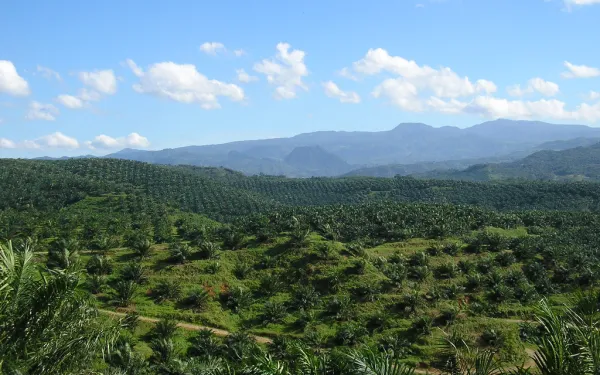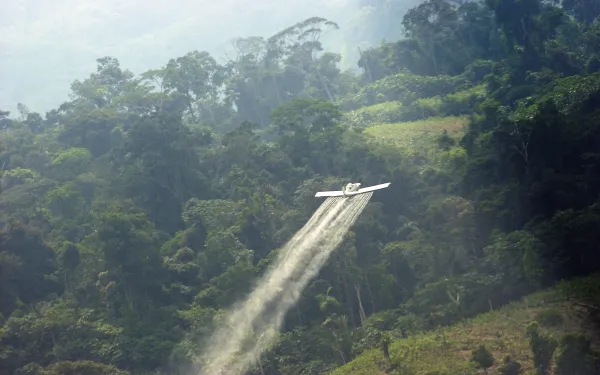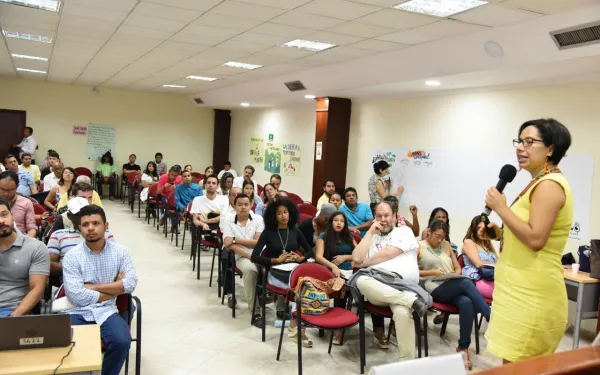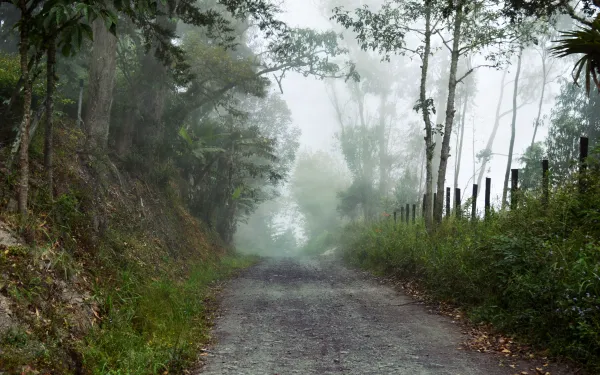
Colombia
Colombia

Almost 16,000 people urge Colombian President Santos to demarcate the Santurbán páramo
In a petition to the Presidency and the Ministry of Environment, thousands of people are calling on the government to define the boundaries of this fragile ecosystem at a scale of 1:25,000 as required by Colombian legislation. Bogota, Colombia—The Interamerican Association for Environmental Defense (AIDA) sent to Colombian President Juan Manuel Santos and his minister of environment and sustainable development, Luz Helena Sarmiento, the signatures of 15,901 individuals calling for the demarcation of the Santurbán páramo to be based on proper scientific criteria at a scale of 1:25,000. The Santurbán páramo, located in the Colombian departments of Santander and Norte de Santander, provides water to nearly two million people, mainly in the cities of Bucaramanga and Cúcuta. The signatures collected over Change.org, the world’s largest petition platform, follow a previous request (in Spanish) by AIDA and prestigious Colombian environmentalists for the government to properly define the borders of the páramo in compliance with national legislation and international standards. This would prevent harmful activities such as large-scale mining from irreversibly damaging this fragile high-altitude wetland ecosystem. Páramos are "water factories" that contain a unique biodiversity and help mitigate climate change. In Colombia, home to the greatest number of páramos in the world, delimitation of this ecosystem is required under national law. That makes this petition even more important because the delimitation of the rest of the country’s páramos could depend on the outcome of the Santurbán decision. The petition promoted by AIDA includes a letter to President Santos and Minister Sarmiento. In the letter, the signatories call on the minister to recognize the entire páramo (more than 82,000 hectares) in the definition of its borders, not just the fraction (11,000 hectares) declared as a Regional Natural Park. For this to happen, the petition calls on the government to apply the parameters already established by Colombian scientists and provides legal arguments to support this requirement. Together with the signatures, AIDA has included a document that analyzes the legal reasons why the government should fully delimit this area (Available in Spanish, here). “Heeding the call of the thousands of signatories in the hemisphere is urgently needed because the risk to the páramos from mining is imminent," said Astrid Puentes Riaño, AIDA co-executive director. "Delineating Santurbán to a scale other than the ratio of 1:25,000 prescribed by the National Development Plan goes against the law. If the minister delimits the moor at a less detailed scale, the decision could be challenged in court.” AIDA's action comes as the Committee for the Defense of Santurbán Páramo holds a protest to protect this valuable ecosystem on November 15 in Bucaramanga. The petition and letter can be read at Change.org.
Read moreThe declaration of Santurbán as a Regional Natural Park is a start toward complying with the prohibition on mining in páramos
FOR IMMEDIATE RELEASE February 7, 2013 Media contacts: Astrid Puentes Riaño, AIDA Co-Director, [email protected], +52-55 5212-0141 Paulo Bacca, AIDA Legal Advisor, [email protected], +57-1 232-4246 The declaration of Santurbán as a Regional Natural Park is a start toward complying with the prohibition on mining in páramos AIDA supports the decision and urges the Ministry of Environment to guarantee the protection of all páramo ecosystems. Bogotá, Colombia. The Interamerican Association for Environmental Defense (AIDA) welcomed the declaration of a portion of the Santurbán páramo in the Colombian departments of Santander and Norte de Santander as a Regional Natural Park. The measure, taken in January, reaffirms the prohibition on mining activities in Colombia’s páramo ecosystems, a move that helps improve the protection of these sensitive wetlands and critical carbon sinks. AIDA expressed its support for the creation of the park in a letter to the Ministry of Environment and Sustainable Development, the Alexander Von Humboldt Institute and the Autonomous Regional Corporation for the Defense of the Bucaramanga Plateau (CDMB) of Colombia, confirming that this act is congruent with the prohibition on mining in the region. It also reminded the government that this does not mean mining can be permitted in other parts of the páramo. The park declaration encompasses 11,700 of the 92,000 hectares of the páramo, and was proposed to the CDMB board of directors by Environment Minister Juan Gabriel Uribe based on a technical report issued by the Von Humboldt Institute. “At AIDA, we have spent more than five years highlighting the national and international obligation of the state to protect páramos. Although creation of the park is a good first step, we insist that the government comply with the law and ensure mining will be prohibited in the entire ecosystem”, said Paulo Bacca, a lawyer at the NGO. AIDA has worked to create and enforce the prohibition on mining in páramos, providing feedback on the Mining Code and related bills, and by following paradigmatic cases like Santurbán. It is a positive step that the Ministry of Environment, in accordance with constitutional and international commitments, has denied the environmental license requested by the Canadian company Greystar Resources Ltd. (now Eco Oro Minerals Corp.) to develop the Angostura gold mine in the heart of the páramo. “This issue goes beyond the legal arena. It is a matter of national security and the quality of life for Colombians given that the páramos are essential for the supply of 70% of drinking water, biodiversity conservation, climate change mitigation and even power generation”, said Astrid Puentes Riaño, co-executive director of AIDA. To prevent the lack of territorial demarcation from being used as justification for allowing mining projects in páramo areas, AIDA urges the Ministry of Environment to immediately make use of the new mapping of páramos provided to it by the Von Humboldt Institute a few months ago. The use of that mapping can help prevent mining companies from hiding behind the lack of a definition and demarcation of critical ecosystems like páramos to advance mining projects in areas where such activities clearly should not be permitted, thus furthering ecosystem and water resource protection critical to Colombian citizens. See the PDF version of the letter (Spanish only). For more information about the Angostura case and Santurbán páramo, please see: http://www.aida-americas.org/en/protecting_the_santurban_paramo_from_angostura_project
Read moreColombian Ministry of Mines announces wetlands protection from open pit mining
Bogotá, Colombia – Colombia has signaled it will halt construction of one of the world’s largest open-pit gold and other metals mine. In a surprisingly bold step March 17, Colombia’s Minister of Mines Carlos Rodado announced “Pursuant to Colombian law, mining projects cannot be developed in wetlands areas.” If enforced, this would prevent construction of the massive Angostura mine in the Santander department, on the Santurban paramo. "This is an important step in fulfilling Colombia’s obligations to its constitution and international wetlands protections,” said Natalia Jiménez Galindo, AIDA's legal adviser in Bogotá. “The State should refrain from approving any phase of the Angostura project, including any additional infrastructure." If built, the Angostura mine would jeopardize the Santurban paramo, a sensitive high-altitude wetland that supply freshwater to more than 1 million people in nearby communities. In collaboration with various partners, AIDA has advocated for the protection of the paramo ecosystems against mining and provided related legal advice to organizations and sending to the authorities an analysis on the international law applicable. “We applaud the Ministry of Mines for recognizing the prohibition against mining in paramos and we expect this will be reflected in an official decision” said Astrid Puentes Co- Director of AIDA. “This will send a strong message from the Government that it is truly interested in protecting paramos and making a difference in climate change”. AIDA calls upon the Colombian government to formally reject the entire Angostura mine project as proposed by Greystar Resources Corporation of Canada. This is the only decision consistent with the norms, the pronouncement by the Ministry of Mines and the Alexander von Humboldt Institute concept.
Read morePublic Hearing on the Angostura Mine Suspended: AIDA Publishes Brief Urging the Colombian Government to Protect the Páramos (Spanish Text Only)
PARA PUBLICACION INMEDIATA CONTACTO: Natalia Jiménez, [email protected] Teléfono: (+57) 310-5734176 Suspendida audiencia pública del proyecto minero Angostura: AIDA publica su intervención en la que insta al Gobierno colombiano a proteger los páramos. Marzo 8 de 2011, Bogotá, Colombia – La audiencia pública programada para el viernes 4 de marzo en la ciudad de Bucaramanga (Departamento de Santander, Colombia) por el Ministerio de Ambiente, Vivienda y Desarrollo Territorial en el proceso de licenciamiento ambiental del proyecto de gran minería de oro a cielo abierto "Angostura" fue suspendida debido a situaciones que impidieron el normal desarrollo de la misma. Por esta razón, la Asociación Interamericana para la Defensa del Ambiente, AIDA hará llegar al gobierno colombiano su escrito de intervención sobre las obligaciones internacionales y constitucionales del Estado colombiano de proteger los páramos, que no pudo presentar en la suspendida audiencia. En los próximos días, el Ministerio de Ambiente, Vivienda y Desarrollo Territorial colombiano deberá pronunciarse sobre la cancelación total de la audiencia o sobre la posibilidad de reanudarla. Estaremos atentos a dicha notificación y nos aseguraremos de que los argumentos aportados por AIDA sean conocidos abiertamente y considerados dentro del proceso de solicitud de la Licencia Ambiental al proyecto Angostura. La misión de AIDA es fortalecer la capacidad de las personas para garantizar su derecho individual y colectivo a un ambiente sano por medio del desarrollo, aplicación y cumplimiento efectivo de la legislación nacional e internacional. La protección de agua dulce es una de nuestras líneas mediante la cual buscamos proteger el derecho al agua y asegurar recursos de agua dulce adecuados para las comunidades y los ecosistemas en las Américas AIDA, 426 17th Street, Oakland, CA 94612 T. (510) 550-6753, F. (510) 550-6740 AIDA Atlixco 138, Col. Condesa, México, DF, 06140, T/F (5255) 52120141 AIDA Diagonal 40 A No 14 – 75, Tel. (57 1) 3381277, Bogotá - Colombia AIDA Costa Rica, San Pedro c/o Centro de Derecho Ambiental y de los Recursos Naturales (CEDARENA) T. (506) 22837080 E-mail: [email protected], Website: www.aida-americas.org
Read moreThe Colombian Government Should Reject the Angosture Mining Project in the Páramos (Spanish Text Only)
PARA PUBLICACION INMEDIATA CONTACTO: Natalia Jiménez, [email protected] Teléfono: (+57) 310-5734176 El Estado colombiano debe rechazar proyecto de gran minería de oro "Angostura" en zona de páramo Desconocería obligaciones constitucionales internacionales Marzo 4 de 2011, Bucaramanga, Colombia – Hoy, La Asociación Interamericana para la Defensa del Ambiente (AIDA) instará al gobierno colombiano a detener un proyecto de gran minería de oro y otros metales que sería un precedente perjudicial para los ecosistemas frágiles en América Latina. El proyecto de minería a cielo abierto Angostura, planeado en el páramo de Santurbán, se encuentra en proceso de aprobación por parte del Ministerio de Ambiente, Vivienda y Desarrollo Territorial colombiano. Hoy se celebra una audiencia pública en la que el Ministerio recibirá argumentos de diferentes sectores. AIDA argumentará que las obligaciones internacionales y constitucionales del Estado colombiano de proteger el ambiente, especialmente áreas de gran importancia ecológica como los páramos, impiden la autorización. "Los páramos son ecosistemas altamente frágiles y la minería a cielo abierto causaría daños graves e irreversibles," dijo Natalia Jiménez, abogada de AIDA. "De acuerdo con la Constitución Política y los Principios de Río, la Convención de Biodiversidad y la de Cambio Climático, todos ratificados por Colombia, el Estado está obligado a conservar los páramos y procurar su intangibilidad." De ser aprobado el proyecto Angostura afectaría de forma definitiva por lo menos 575 ha del páramo de Santurbán (más del 50%), pudiendo afectar un área mayor. En Colombia, como en el resto de la región Andina en los páramos se origina la mayor parte del agua dulce que consumen los habitantes. Tienen una alta capacidad de purificar el ambiente, de estabilizar los suelos y el clima, de prevenir los deslaves y los derrumbes y de contener un alto nivel de animales y plantas. En efecto, son el hábitat de especies únicas en el mundo como el oso de anteojos y el cóndor de los Andes. La Procuraduría General de Colombia, miembros del Parlamento Andino y ex ministros de ambiente, así como organizaciones y expertos ambientales se oponen a la licencia. El proyecto carece de un adecuado Estudio de Impacto Ambiental integral, pues los impactos de la mina y los de la infraestructura complementaria, se analizan en dos procesos de forma fragmentada. Por ello, AIDA también solicita que el Ministerio los unifique y analice el impacto global del proyecto. Así lo ordenan los estándares internacionales y la Corte Suprema de Canadá, país de origen de la empresa Greystar Resources Ltds. que promueve el proyecto. La misión de AIDA es fortalecer la capacidad de las personas para garantizar su derecho individual y colectivo a un ambiente sano por medio del desarrollo, aplicación y cumplimiento efectivo de la legislación nacional e internacional. La protección de agua dulce es una de nuestras líneas mediante la cual buscamos proteger el derecho al agua y asegurar recursos de agua dulce adecuados para las comunidades y los ecosistemas en las Américas. AIDA, 426 17th Street, Oakland, CA 94612 T. (510) 550-6753, F. (510) 550-6740 AIDA Atlixco 138, Col. Condesa, México, DF, 06140, T/F (5255) 52120141 AIDA Diagonal 40 A No 14 – 75, Tel. (57 1) 3381277, Bogotá - Colombia AIDA Costa Rica, San Pedro c/o Centro de Derecho Ambiental y de los Recursos Naturales (CEDARENA) T. (506) 22837080 E-mail: [email protected], Website: www.aida-americas.org
Read moreNational and International Organizations File Suit Against Colombian Mining Law to Protect Fragile Ecosystems Like the Páramos
FOR IMMEDIATE RELEASE: September 11, 2008 CONTACTS: Jerónimo Rodríguez, AIDA, (571) 3683889, Daniel Manrique, GESAP, (571) 5702393, [email protected] [email protected] National and International Organizations File Suit against Colombian Mining Law to Protect Fragile Ecosystems Like the Páramos Bogota, Colombia – On September 8th, the Colombian Constitutional Court admitted a lawsuit filed against the Colombian Mining Law by the Interamerican Association for Environmental Defense (AIDA) and the Corporación Gestión por los Intereses Ambientales y Públicos (GESAP Initiative). The law permits mining exploration and exploitation in ecosystems of special ecological interest, such as the Andean páramo, which infringes upon national and international legislation, in particular the Colombian Constitution. The Andean páramos are unique, high-mountain ecosystems that serve as indispensable water reservoirs and regulators. Numerous rivers and lakes in Colombia originate in the páramos, the majority of which are used for drinking water. Páramo soils also capture and store atmospheric carbon. The law at issue in this suit (Article 34 of the Mining Law) opens these and other critical natural areas to mining unless they have been previously defined and declared protected by environmental authorities. “Mining in fragile ecosystems destroys them and violates our Constitutional right to a healthy environment. For this reason, we are asking the Court to apply our Constitution and international principles on sustainable development to effectively limit mining activities and protect these valuable and sensitive ecosystems,” noted Jerónimo Rodríguez, AIDA’s legal advisor in Colombia. Mining impacts on the páramo have already caused concern among Colombian authorities such as the Colombian Attorney General, which noted in its cautionary report, The Situation of the Colombian Páramos in the Face of Human Activity and Climate Change (2008), that “threats from activities with highly negative impacts on the páramos, such as mining, imply not only a loss of biodiversity, but also a national security problem related to the loss of a large number of environmental goods and services, among which is principally, our water supply.” “If this provision of law is determined unconstitutional, in the future when mining exploration and exploitation projects are proposed within these ecosystems, even if they have not been defined or declared protected, there will be sufficient reason for environmental authorities to deny licenses for these activities,” concluded Rodríguez. AIDA is a non-profit environmental law organization that works in the Americas to strengthen people’s capacity to guarantee their individual and collective right to a healthy environment through the development, implementation, and effective enforcement of national and international laws. Among other issues, AIDA focuses on protecting the right to water and ensuring adequate fresh water resources for communities and ecosystems in this hemisphere.
Read more
Colombian Court Orders the Suspension of Plan Colombia Spraying
FOR IMMEDIATE RELEASE: June 26, 2003 CITING RISK TO HUMAN HEALTH AND THE ENVIRONMENT, COLOMBIAN COURT ORDERS THE SUSPENSION OF THE US-FINANCED SPRAYING OF COCA AND POPPY CROPS OAKLAND, CA/BOGOTA, COLOMBIA – A recent decision by the Superior Administrative Court of Cundinamarca, Colombia, (released to the public on June 25) declared that the aerial spraying with herbicides to eradicate coca and poppy crops violates the Colombian constitutional rights to a healthy environment, security and public health. As a result, the court ordered that the aerial spraying of potent glyphosate herbicides be suspended until the government complies with the Environmental Management Plan for the eradication program, and conducts a series of required studies intended to protect human health and the environment. This verdict supplements earlier declarations by the Colombian Constitutional Court and the State Council, which respectively ordered the suspension of spraying in indigenous territories and full compliance with the Environmental Management Plan approved by the Ministry of Environment. According to Yamile Salinas of the Colombian Ombudsman’s Office, “This ruling recognizes the potential risks that the herbicide and the manner in which it is being applied pose to human health and the environment in Colombia,” She added that, “The application of the precautionary principle is of singular importance because the Court affirms that the significant and potentially irreparable risk posed by the spraying is reason enough to suspend the fumigation program.” “The US Congress has required the State Department to evaluate environmental and health impacts of Plan Colombia. This decision by a court in Colombia must be taken into account by the US State Department,” said Anna Cederstav, staff scientist with Earthjustice and AIDA. “In light of the evidence presented and the court’s clear decision on this matter, the Department of State cannot certify to Congress that the herbicide mixture, in the manner it is being used, poses no unreasonable risks or adverse effects to humans or the environment, or that the herbicide is being used in compliance with the Environmental Management Plan for the program.” She concluded that, “It would be highly irresponsible for the United States to continue the eradication program in contravention of the Colombian court order to suspend the spraying until appropriate public health and environmental protections are in place.” “This court order formally adopts many of the requirements for environmental and human protection that the Colombian Ombudsman and Comptroller General, along with both national and international non-government organizations, have been demanding for years,” said Yamile Salinas. “This decision is a victory for both public health and the environment of Colombia.” Press Contacts: Anna Cederstav, Staff Scientist with Earthjustice and AIDA, (Oakland, CA) tel. 510-550-6700 Yamile Salinas, Colombian Ombudsman’s Office, (Bogotá, Colombia) tel. 571-314-7300 Ext. 2324
Read more

